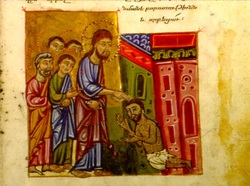
Sermon by St. Jerome the Priest
When the Lord was come down from the mountain, great multitudes followed him, albeit they had not followed him when he went up the heights. And first there came to him a leper. This poor creature's disease had prevented him from hearing the Saviour's long Sermon on the Mount. And it is to be noted that this is the first specific mention of a miracle of healing. The second was the Centurion's servant; the third was Peter's wife's mother, who was sick of a fever at Capernaum; the fourth were they who were brought unto Christ as being troubled with evil spirits, from whom he by his word cast out the evil spirits, at the same time that he healed all that were sick.
And behold, there came a leper, that is, he came in hopes of being healed, for it was fitting that, after the preaching and teaching of our Lord, an occasion should present itself for a sign, wherein the power of a miracle might confirm the truth of the teaching which had just before been given. So the leper came, and worshipped him, saying: Lord, if thou wilt, thou canst make me clean. He prayed the Lord to have the will; therefore he doubted not that he had the power. And Jesus put forth his hand, and touched him, saying: I will; be thou clean. And as soon as the Lord put forth his hand the leprosy departed. Let us remark how lowly and unboastful is the Lord's language. The leper said: If thou wilt: and the Lord made answer: I will. The leper said: Thou canst make me clean: and the Lord made answer: Be thou clean. Most Latin readers, misled by the identity of form in that language between two different uses of the verb, do read Christ's answer as if it were: I will to make thee clean. This is wrong. The sentences are separate. First cometh the expression of volition: I will: then the command: Be thou clean.
And Jesus saith unto him: See thou tell no man. What need was there to tell what his body shewed? But go thy way, saith the Lord, shew thyself to the priest. There were divers reasons why Christ should send him to the priest. First, for humility's sake, that he might shew reverence to God's priest. Then there was a command in the Law that they who were cleansed of leprosy should make an offering to the priest. Again, there were further reasons: that, why the priests saw the leper cleansed, they might either believe in the Saviour, or refuse to believe; if they believed, that they might be saved, and, if they believed not, that they might have no excuse. Lastly, the Lord wished to give no ground for the accusation that was so often brought against him, that he was unobservant of the Law.





